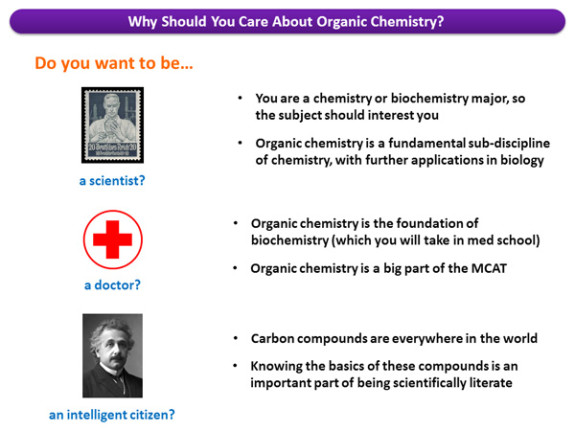Another summer has come to an end, and we’re already two weeks deep into the fall semester. I spent part of my last day of summer freedom updating my calendar for the semester, and it was not pretty. So many classes, so many office hours, so many meetings.
I’ve seen a variety of approaches that professors take to the first day of class. Some just review the syllabus and call it a day. Some play icebreaking games and have students introduce themselves, while others dive right into the first chapter of the text. For me, I spend most of the first lecture addressing the question:
Why should I care about organic chemistry?
In broad strokes, we go over what we will learn in the class and why this information is important for scientists and health professionals. Here’s the opening slide from the deck:
If you can’t make a strong case why your class is important to students, why should they waste time studying it?
For me, the argument extends beyond why organic chemistry is important in and of itself. While I hope that some of my love of the subject rubs off, I am under no delusions that everyone will enjoy the class. Many students take it simply to fulfill a requirement for their degree or pre-health program. In these cases, I equate the class to Brussels sprouts. While the dish might be hard to stomach, eating it is good for you and necessary for mom to bring dessert. If you want to be a doctor, you’re going to have to do well in organic. So do it. If your career goal is what motivates you, let it motivate you to do well in orgo.
My view on “who cares?” or “why should I care?” extends to attendance. I don’t take attendance, because it’s irrelevant. My job as an instructor is to: (i) teach course material and (ii) judge student mastery of the material. If students see fit to invest their time in something other than my class, that’s just as likely a statement about the ineffectiveness of my lectures than a statement about their lack of motivation. The student is in the best position to judge my value to them as a teacher. If a student believes their time is better spent elsewhere, that’s fine. When grading, I’ll be calling balls and strikes the same way I would for all of the other students. Once again, attendance is irrelevant—except for mine.
Providing a compelling answer to “who cares?” is just as important outside of the classroom. When giving a talk, you need to invest a few minutes at the beginning to help your audience understand why your research is important. If you don’t, what’s going to stop people from checking their phones and tuning you out? If you find yourself having trouble explaining to your audience why your research is interesting or important, perhaps you should work on something else.
And when writing a paper, one of the first things you should address is why anyone should care about your work. If your reader doesn’t think your research is interesting or important, why should she read it? Why do so many papers in chemistry journals open with sentences like “Dullicin B is a toxin produced by the Ithacan slug, Limax cornellicus“?
Who cares?
Is your paper about the isolation of the compound? No. Do chemists care about mollusks? Not especially. So why would you waste prime real estate in your opening paragraph talking about these pieces of trivia? By all means, share these details, but do it later in the paper after you’ve already hooked the reader.
Journalists are taught this approach as the inverted pyramid, and they use it because readers are prone to move to the next story at any moment. Perhaps scientists would use a similar approach if anyone bothered to teach us about writing.
